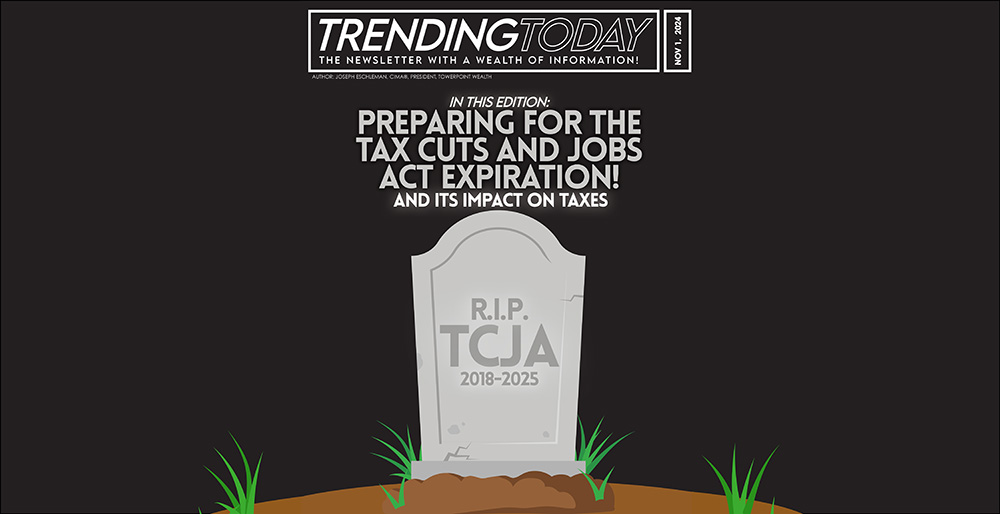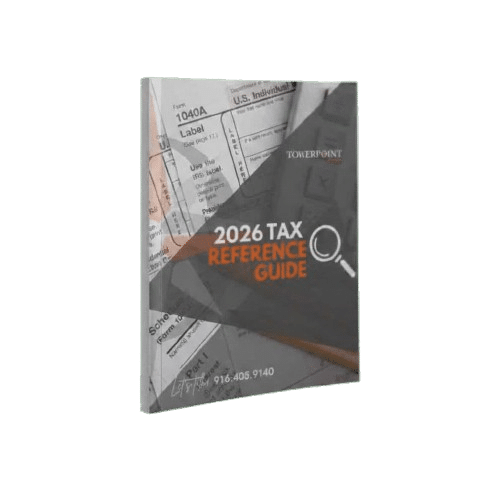Preparing for the Tax Cuts and Jobs Act (TCJA) Expiration at the end of 2025 and Its Impact on Taxes
The clock is ticking on one of the most significant tax overhauls in recent history. As the sun is “set to set” on the Tax Cuts and Jobs Act (TCJA) at the end of 2025, millions of Americans are now wondering, “What might my 2026 tax bill look like?”

The TCJA of 2017 brought sweeping changes to the U.S. tax code, impacting everything from individual income tax rates and the standard deduction, to estate tax exemptions, mortgage interest, and charitable donation deductions.
For many Americans, these changes have meant lower taxes and simplified filing processes, but these benefits were not written nor legally allowed to last forever. Many of the key provisions that were introduced under the TCJA are set to expire, or “sunset” at the end of 2025, creating a significant possible shift in the tax landscape that could affect millions of taxpayers if the legislation is not extended.
The TCJA expiration could mean a higher tax bill for you, fewer deductions, and a possible shift in how you plan for your financial future. Whether you're concerned about your income tax rate, the standard deduction, or tax credits that benefit your family, it’s crucial to understand how these changes could impact your bottom line and what steps you can take to prepare.
In this article, we’ll explore what you can expect ahead of a possible TCJA expiration, and considerations on how you can proactively adjust your financial strategy to stay ahead of these potential tax changes.
Key Takeaways
- Many Tax Cuts and Jobs Act (TCJA) provisions are set to expire, or “sunset,” at the end of 2025, potentially leading to higher tax bills and fewer deductions for many taxpayers.
- Key provisions at risk of expiration include the increased standard deduction, lower income tax rates, the Child Tax Credit, state and local tax (SALT) deductions and more.
- If the TCJA expires, the standard deduction will decrease significantly, making itemized deductions more relevant again, impacting how taxpayers calculate their taxable income.
- The 20% deduction for qualified business income will no longer be available for small business owners, increasing their tax liability.
- It is uncertain if Congress will extend the expiring tax provisions.
- Consulting with a financial advisor can help you develop strategies to mitigate these potential tax impacts, and optimize your financial planning ahead of the potential changes.
What is the Tax Cuts and Jobs Act (TCJA)
The Tax Cuts and Jobs Act (TCJA) of 2017 was a landmark reform of the U.S. tax code, bringing about significant changes for both individuals and businesses. Passed by Congress and signed into law by President Donald Trump, the act aimed to stimulate economic growth by reducing taxes for individuals and businesses.
Thanks to the TCJA, many individuals enjoyed lower tax rates, a bigger standard deduction, and improved tax credits — like the Child Tax Credit — that put more money back in their pockets. On the corporate side, it significantly reduced the corporate tax rate, from 35% to 21%, and introduced incentives for businesses to invest in the U.S.
While many of the TCJA’s changes were permanent, several key provisions for individuals, like lower tax brackets and the higher standard deduction, were temporary and are set to expire at the end of 2025.
Key Expiring Tax Provisions in 2025
As the TCJA nears its expiration date at the end of next year, several major provisions are set to sunset, significantly impacting individual taxpayers. Understanding these key changes can help you anticipate how your tax situation may shift and what adjustments may be necessary for your financial planning.
Standard Deduction and Personal Exemption
One of the most widely felt changes under the TCJA was the near doubling of the standard deduction, which simplified tax filing and created significant tax savings for millions of Americans. For 2026, the standard deduction for married couples filing jointly would be roughly $30,600 without a TCJA expiration, while single filers would enjoy a deduction of $15,350.
However, if the TCJA expires as scheduled, the standard deduction will drop dramatically. Come 2026, married couples filing jointly could see it shrink to around $16,600, while single filers might only get about $8,300.
Additionally, the TCJA eliminated personal exemptions, which used to provide tax relief for dependents. When the act expires, personal exemptions will return, with each exemption set to be around $5,275. While the return of personal exemptions might offset the lower standard deduction for some families, the overall impact could be a much more complex tax filing process and higher taxable income for others.
Individual Income Tax Rates
Another major change under the TCJA was the reduction of marginal income tax rates across the board. For example, the top marginal tax rate fell from 39.6% to 37%, while the rates for lower tax brackets also saw impactful reductions. If the TCJA expiration happens, these rates are expected to revert to their pre-2017 levels, meaning higher income tax rates for virtually all taxpayers.
Here’s a brief look at how some of the tax brackets will change for single filers if the TCJA expires:
- The 12% bracket will revert to 15%.
- The 22% bracket will revert to 25%.
- The 24% bracket will revert to 28%.
- The 32% bracket will revert to 33%.
- The 37% bracket will revert to 39.6%.
This hike in tax rates could mean heavier tax bills for many, and may require adjustments to tax-saving strategies like retirement contributions or charitable giving.
State and Local Tax (SALT) Deduction
The TCJA placed a $10,000 cap on the state and local tax (SALT) deduction, which primarily affected high-income earners in states with high property and/or income taxes. If the Act expires, the SALT deduction cap will be removed, allowing taxpayers to deduct the full amount of their state and local taxes. This change will disproportionately benefit taxpayers in high-tax states — such as California, New York, and New Jersey.
For individuals in these states, the restoration of the full SALT deduction could result in significant tax savings. However, it's important to note that while this may benefit some taxpayers, the loss of other TCJA provisions could offset these savings.
Child Tax Credit
The TCJA increased the Child Tax Credit (CTC) from $1,000 to $2,000 per child under age 17, creating a substantial tax benefit for families. It also raised the income thresholds at which the credit phases out, allowing more middle and upper-income families to also take advantage of the credit. For 2024, the refundable portion of the credit is set at $1,700.
Should the TCJA expire, families could see the Child Tax Credit drop back to just $1,000 per child, which, when adjusted for inflation, would be about 25% less than its 2017 value. This reduction would place a heavier tax burden on families, particularly those with multiple children, and could necessitate adjustments in budgeting or saving for future expenses.
20% Deduction for Qualified Business Income (Section 199A)
Small business owners and individuals with pass-through income — such as sole proprietors, partners, and S-corporation owners — benefited from the TCJA’s 20% deduction for qualified business income (QBI). This deduction allowed eligible taxpayers to reduce their taxable income by up to 20%, resulting in substantial tax savings for many small business owners.
If the TCJA expires, this deduction will no longer be available, meaning that small business owners could face higher tax bills. This change may prompt business owners to explore other tax-saving strategies or restructure their operations to minimize the impact.
Alternative Minimum Tax (AMT)
The Alternative Minimum Tax (AMT) was designed to ensure that high-income taxpayers pay a minimum amount of tax, regardless of how many deductions or credits they claim. The TCJA raised both the exemption amounts and the income thresholds at which the AMT applies, reducing the number of taxpayers subject to the AMT.
In the event of the Tax Cuts and Jobs Act Expiration, the AMT exemption will drop significantly — from approximately $140,300 for married couples filing jointly in 2024 to around $110,075 in 2026. This could mean that more taxpayers, particularly high earners, may find themselves subject to the AMT again, potentially resulting in higher tax liabilities.
Estate Tax Exemption
For individuals concerned about estate planning, the TCJA also doubled the estate tax exemption, providing significant tax relief for wealthy families. Under the TCJA estate tax exemption, this exemption would be $28.6 million for married couples in 2026, meaning only estates valued above this amount are subject to the federal estate tax.
However, if the TCJA expires, the estate tax exemption will fall to approximately $14.3 million for married couples. This reduction could expose more estates to federal estate taxes, and may require estate planning strategies, such as gifting or the creation of trusts, to minimize the tax burden on heirs.
Will the TCJA be Extended?
As we approach 2025, many individuals and businesses are left wondering: will the Tax Cuts and Jobs Act (TCJA) be extended?
The reality is that the future of these provisions remains uncertain. While some political leaders advocate for extending favorable tax measures, including lower tax rates and increased deductions, there is no definitive answer yet.
As part of his campaign for the 2024 Presidential Election, former President Donald Trump has expressed a desire to extend all expiring provisions, signaling support for maintaining the benefits that many taxpayers have enjoyed since the TCJA was enacted.
Vice President Kamala Harris, on the other hand, has indicated that any discussions around tax increases should avoid impacting those earning less than $400,000, suggesting that certain provisions may be preserved for middle-income earners.
Ultimately, the decision lies in the hands of Congress and our new President, and their actions leading up to the expiration deadline will be crucial. Given the uncertain political landscape and the varying opinions on taxation, it’s conceivable that lawmakers might step in to extend at least some of these temporary provisions.
However, until a resolution is reached, there is still uncertainty as to what may happen next. It’s wise for individuals and businesses alike to remain vigilant and consult their financial advisors to navigate the evolving tax landscape effectively.
How Can I Prepare for These Expirations?
With the potential expiration of key provisions of the Tax Cuts and Jobs Act (TCJA) looming, individuals and businesses should take proactive steps to assess how these changes could affect their finances. Financial advisors can be key partners in helping you navigate this transition and minimize any negative impacts on your income and overall financial situation.
For individuals, your advisor can review your income, deductions, and credits to understand how expiring provisions like the lower tax rates, increased standard deduction, and enhanced child tax credit will affect your tax liability. They can also recommend tax-efficient strategies — such as accelerating income or charitable giving before any potential tax changes take effect — or maximizing retirement contributions to reduce taxable income.
Businesses, on the other hand, can benefit from working closely with their financial advisor to review the potential loss of the 20% deduction for qualified business income and other favorable provisions for pass-through entities.
Advisors can also help business owners reassess their corporate structure, and determine whether it makes sense to make changes ahead of the tax shift, ensuring that you're well-positioned to handle a potentially higher tax environment.
Ultimately, planning ahead with your financial advisor can help you avoid surprises in the next two years,and create strategies that better protect your financial future if the TCJA provisions do expire.
Final Thoughts
As the expiration of the Tax Cuts and Jobs Act (TCJA) approaches at the end of 2025, individuals and businesses need to stay informed about the potential changes to key tax provisions.
A significant reduction in the standard deduction, a return to higher individual income tax rates, and the elimination of the 20% deduction for qualified business income could all impact financial situations substantially. The reinstatement of personal exemptions and the removal of the SALT deduction cap may also alter how taxes are calculated, especially for those in high-tax states.
Given the uncertainty surrounding whether Congress will extend these expiring tax provisions in 2025, it’s imperative that you consult with your financial advisor to proactively assess your tax strategy. They can help you navigate these changes, optimize your financial planning, and prepare for possible shifts in tax liability.
At Towerpoint Wealth, we know that staying ahead of the curve now can ensure you’re better positioned to handle the implications of the TCJA’s expiration, allowing you to make informed decisions that support your financial goals. If you’re worried about how expiring provisions of the TCJA could affect your tax bill, we invite you to schedule an initial 20-minute “Ask Anything” discovery call with us to see how our wealth advisors can help you navigate your financial planning.
Want to learn more about proposed tax policies ahead of the 2024 election? Check it out here!

Joseph Eschleman
Certified Investment Management Analyst, CIMA®
Jonathan W. LaTurner
Wealth Advisor
Steve Pitchford
CPA, Certified Financial Planner®
Lori A. Heppner
Director of Operations
Nathan P. Billigmeier
Director of Research and Analytics
Michelle Venezia
Client Service Specialist
Luis Barrera
Marketing Specialist
Megan M. Miller, EA
Associate Wealth Advisor
Isabella Orozco,
Office Coordinator
Connect with Towerpoint Wealth, your Sacramento Financial Advisor, on any of these platforms, and send us a message to share your preferred charity.
We will happily donate $10 to it!
Follow TPW on LinkedIn
Follow TPW on YouTube
Follow TPW on Facebook
Follow TPW on Instagram
Follow TPW on X
Follow TPW Podcast









